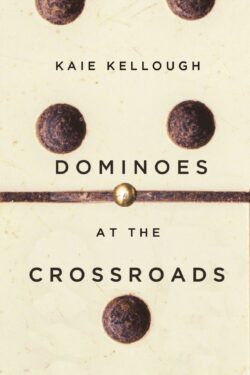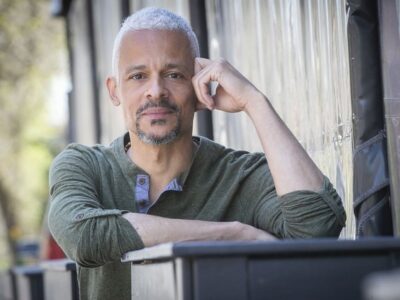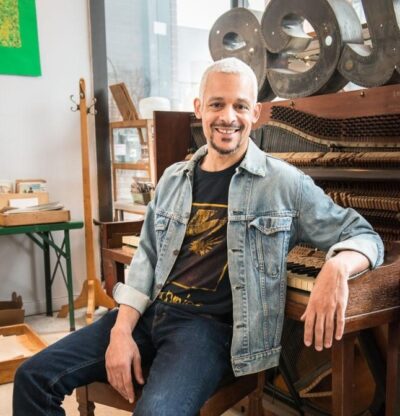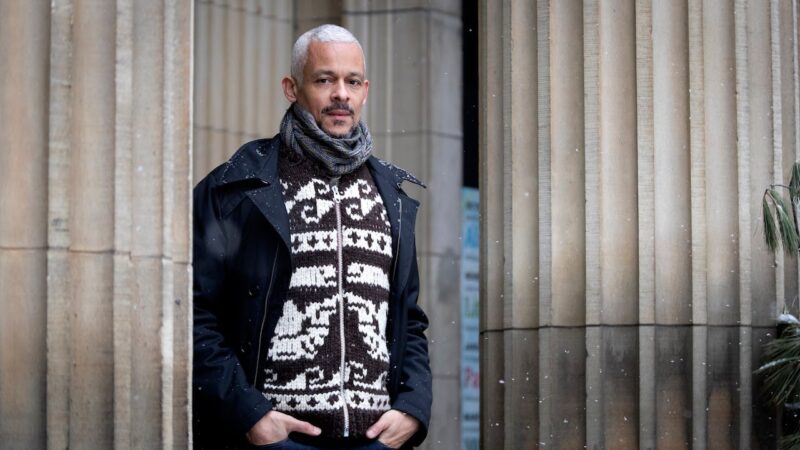1082 Black Canadian ancestry & identity
Dominoes at the Crossroads
by Kaie Kellough
Montreal: Véhicule Press (Esplanade Books), 2020
$19.95 / 9781550655315
Reviewed by Natalie Lang
*
 The time has long past when only one community’s work would be required to cure what ails us. — Zadie Smith, from Intimations: Six Essays (2020)
The time has long past when only one community’s work would be required to cure what ails us. — Zadie Smith, from Intimations: Six Essays (2020)
In a time when uncertainty stands at the forefront of our collective consciousness and past injustices have resurfaced to question comfortable norms, Kaie Kellough calls for a close examination of how time throughout history is understood as it relates to our present and future selves and through the lens of Black Canadian perspectives. Kellough’s inaugural short story collection, Dominoes at the Crossroads, is centred on Black Canadian identity. Invoking a future that exists both in the past and in the present, he calls for a “radical reimagining” (p. 19) in how yesterday’s events are brought forward to the present to ensure a more stable and equitable future. When the compartmentalization of time, identity, race, and culture is eliminated, recognition can emerge that “the past [leaks] into every crevice of life” (p. 35), permeating the present and living simultaneously as ongoing, living history that affects every element of who we are as individuals, communities, and countries.

With books including Magnetic Equator (2019) and Accordéon (2016), Kellough has also published dynamic musical explorations of the effect of migration through vocal performance, recorded audio, and electronic narrative. He has been awarded the Griffin Poetry Prize and the Québec Writers’ Federation Hugh MacLennan Prize for Fiction. However, it is his work in Dominoes at the Crossroads, where his narrative carries a profound weight in questioning how common ancestry, class, and tragedy between generations bind and connect us. Each story here stands strong on its own while simultaneously weaving threads of history, race, coming of age, and the changing tides of time from one chapter to the next, while often connecting to life-altering moments in other parts of the world and in the Black history in Canada.
A novelist, poet, and sound performer, born in Vancouver, Kaie Kellough currently lives in Montreal. Yet it is his roots in Guyana and his musical travels throughout the UK, Australia, Asia, the Caribbean, and continental Europe that illuminate the vivid snapshots captured within this collection. Kellough’s stories, whose characters include a future great grandson, aging and emerging musicians, rebels, and racially discriminated youth, open a dialogue about place, belonging, and identity in the African diaspora.
Characters throughout Dominoes find themselves navigating systemic racism, slavery, revolt, and struggles with cultural identity in locations ranging from Montreal, Winnipeg, Calgary, and Vancouver to the Guyanese capital of Georgetown at multiple points through history and in the future. Kellough’s characters confront exclusion, violence, misinformation, and racial prejudice as they walk paths directed toward radical and subtle resistance and activism in search of a place of relative peace and freedom in a modern society that continues to devalue Black lives.

Petit Marronage, the longest story in the book, showcases a myriad of connections between place, people, history, and modernity, encompassing the diasporic nature of the entire collection. Through the experience and language of Jazz musicians, and a musical beat to the writing itself, Petit Marronage — “running away” — forges a timeless connection where the past walks alongside and is embedded in the present. Characters come of age in Montreal, Caribbean ancestors are marooned, dreams of ghostly pasts are folded into modern injustices and racism in Fredericton; Paul Bogle is immortalized through a retelling of the 1865 Morant Bay uprising in Jamaica; and a vivid description of a painting hanging in the National Gallery of Jamaica reflects on “the time when slavery was active on the island. An African man had his flank pierced by an iron hook, which hooked around one rib, and poked out the flesh below” (p. 107).
Through “themes of distance and dispersal” (p. 112), Kellough’s stories are written as mirrors for the travels that ancestors took, by choice or by force, that concurrently belong to a history that continues to affect Black lives in Canada today. Petit Marronage and other stories in Dominoes at the Crossroads are almost written over top of one another, folding and mixing in the way a baker works with dough, lifting fold over fold until one identity becomes entwined with the identities of the past. We are always held in eternal “permanent suspension” (p. 113), simultaneously us and them, not fully belonging here, there, or anywhere.
Imploring a more subtle revolution through these stories, Kellough successfully plants the reader in two or more places, embodying diverse identities at multiple points in time while showcasing the effects of discrimination and racism. He recognizes, though, in We Free Kings that most days, most of us don’t think about any of this. As a character in this story reflects, “I drink my espresso, I calculate the fastest way to pay off my mortgage, I worry about my children, I arrive early to work. I live” (p. 139).That is, we continue to live — despite the discontent surging in our time, unsatisfying attempts at change that erupt in social media and in social and government policies, and a sweeping understanding of a need to alter perspectives.
The question becomes, then, if “each generation needs to do better than the previous” (p. 143), if music and storytelling can be an “antidote to the rage and consternation of the world” (p. 164), and if with each new generation we grow more removed from our cultural history and identity — where “lives blur into a vast anonymous sweep of existence” (p. 205) — how do we develop as an equitable nation and nod respectfully to those who crossed oceans and continents, were uprooted and marooned, and who refused to be erased? Kellough’s solution is to uplift voices, to offer insights into diaspora, migration, and belonging in Canada; to acknowledge that we can be scattered and flung across cultures and countries and still come together as “words drift in the timelessness of thought” (p. 206).
In the chaotic cultural climate of our time, we can let narrative — through music, storytelling, and Dominoes at the Crossroads — move through and transform the world as the world moves through and transforms narrative, in the same way that the ghosts of our ancestors live with us, and that we ourselves set the stage for those lives that have yet to emerge.
For Kaie Kellough, the outcome in adopting this insight is to extend historical cultural identity “forever in both directions, into the past so it erases everything, and into the future so it’s all we ever experience, [a] muted, unassuming joy” (p. 137). I was much taken by this radical reimagining.

*

Natalie Lang is a teacher and writer. She is also currently a master’s student in the GLS (Graduate of Liberal Studies) program at SFU. She is based in Abbotsford, BC, where she teaches literature at Rick Hansen Secondary, and lives in a renovated barn in the heart of Sumas Mountain. Editor’s note: Natalie Lang has reviewed books by Dave Doroghy, Sheena Kamal, Jae Waller, carla bergman, Sonnet L’Abbé, Larry Hannant, Tanya dePape, Emily Lycopolus, Alicia Tobin, and Cait Flanders for The Ormsby Review. She has also contributed an essay, Remnants of Sumas Mountain, to The Ormsby Review.
*
The Ormsby Review. More Books. More Reviews. More Often.
Publisher and Editor: Richard Mackie
The Ormsby Review is a journal service for in-depth coverage of B.C. books and authors. The Advisory Board consists of Jean Barman, Wade Davis, Robin Fisher, Cole Harris, Hugh Johnston, Patricia Roy, David Stouck, Maria Tippett, and Graeme Wynn. Scholarly Patron: SFU Graduate Liberal Studies. Honorary Patron: Yosef Wosk. Provincial Government Patron since September 2018: Creative BC
“Only connect.” – E.M. Forster